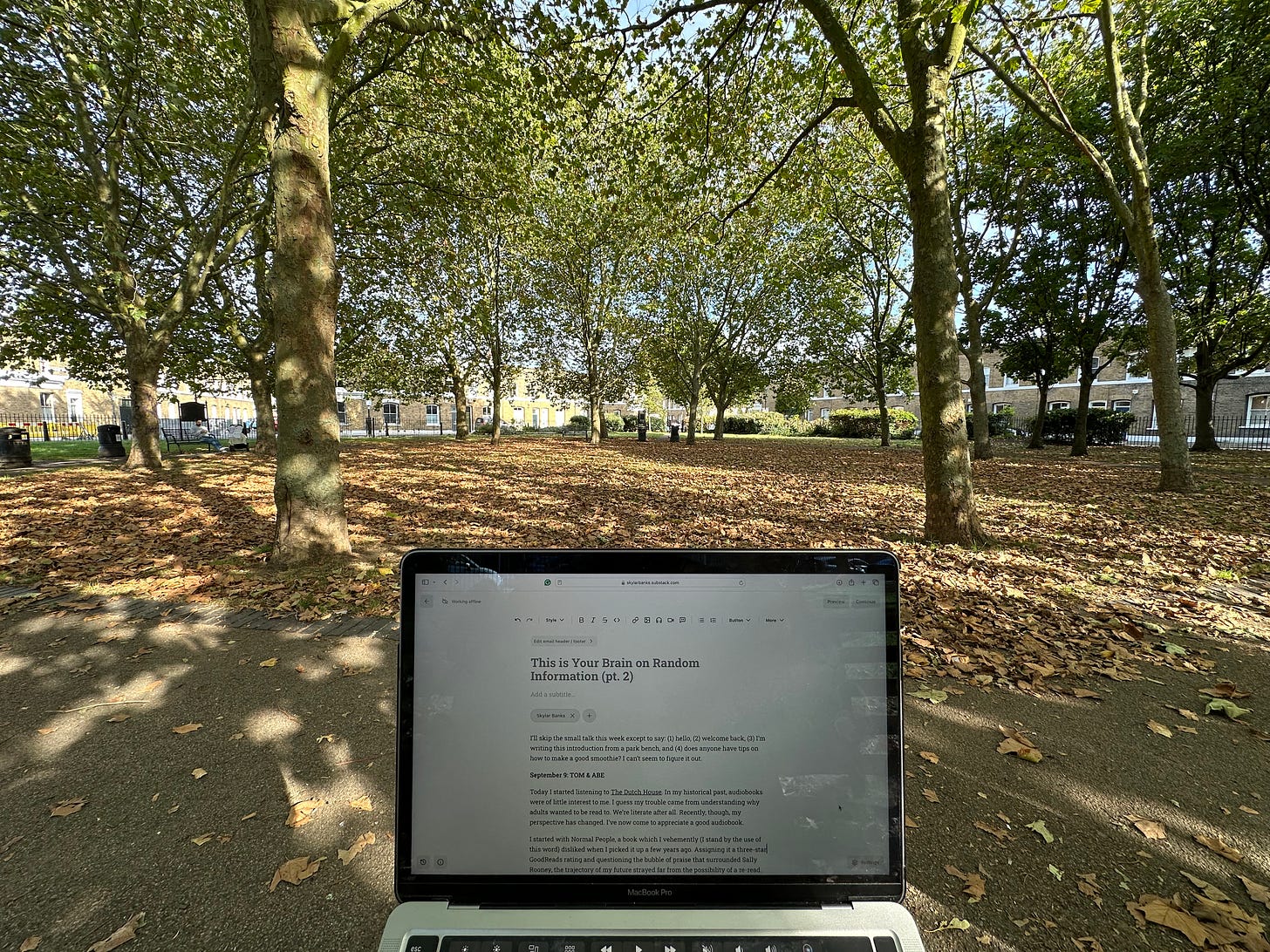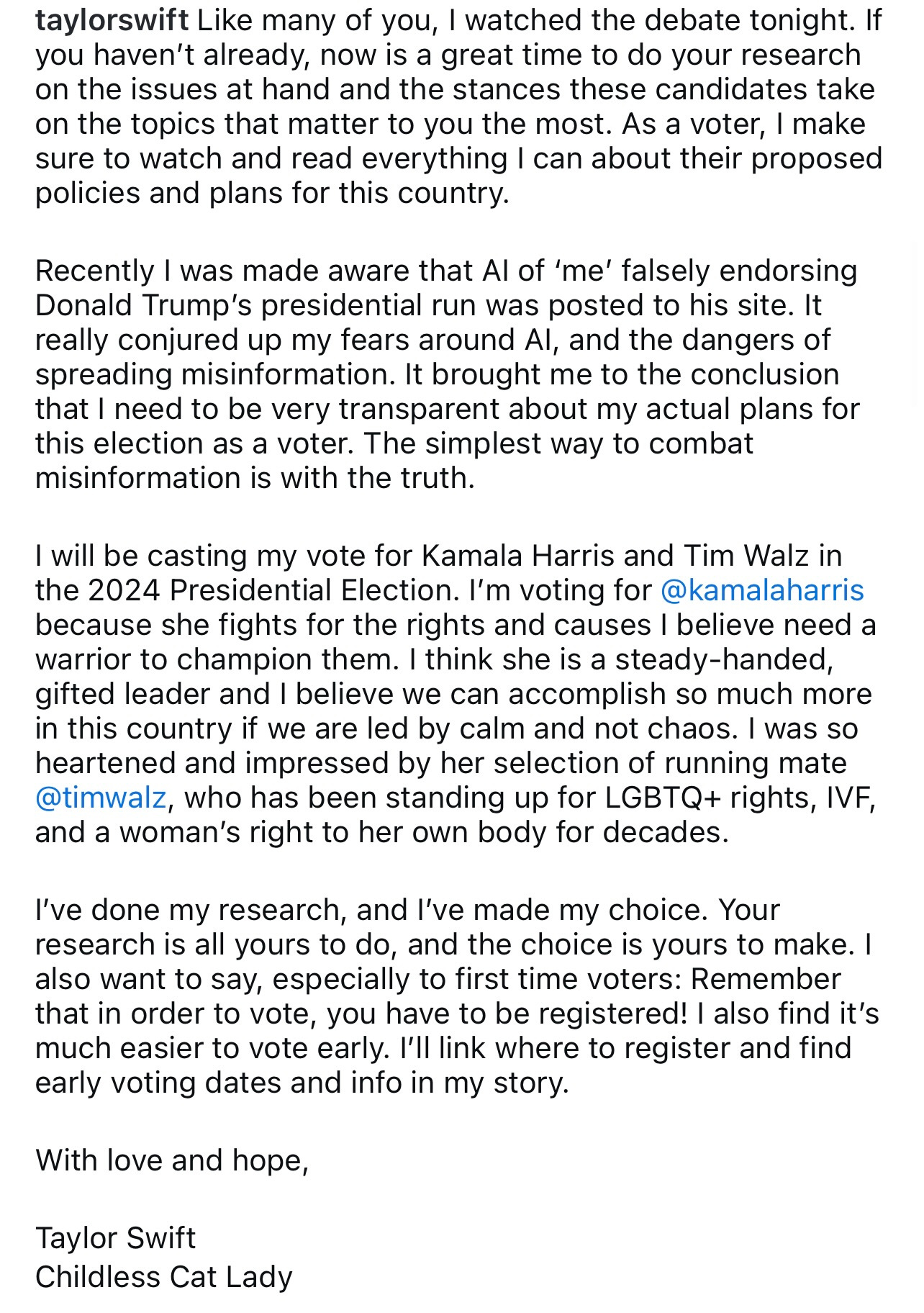This is Your Brain on Random Information (pt. II)
Distant relatives, Gen Alpha slang, celebrity endorsements, chess, and Friday the 13th
I’ll skip the small talk this week except to say: (1) hello, (2) welcome back, (3) I’m writing this introduction from a very uncomfortable bench in a park off Columbia Road, and (4) does anyone have tips on how to make a good smoothie? I can’t seem to figure it out.
September 9: TOM & ABE
Today I started listening to The Dutch House. In my historical past, audiobooks were of little interest to me. I guess my trouble came from understanding why adults wanted to be read to. Recently, though, my perspective has changed. I’ve now come to appreciate a good audiobook.
I started with Normal People, a book which I vehemently (I stand by the use of this word) disliked when I picked it up a few years ago. Assigning it a three-star GoodReads rating and questioning the bubble of praise that surrounded Sally Rooney, the trajectory of my future strayed far from the possibility of a re-read. But when Paul Mescal and Daisy Edgar-Jones so stunningly changed my perception, I thought I would give it another shot.
As an audiobook, Normal People is fantastic. The dialogue’s foolish absence of written punctuation doesn’t translate when read aloud. The audio-booker (if someone who speaks on a podcast is called a podcaster, is someone who reads an audiobook also called an audio-booker?), a voice actress named Aoife, has an Irish accent that I adore. The list goes on, but is completely beside the point.
Given the importance of a nice reading voice, I was excited to see Tom Hanks’s role as The Dutch House’s audio-booker. Sometimes he strangely speaks with an intense Southern accent. Other times I think he sounds like Joe Biden. In all instances though, it’s hard not to think that Forest Gump is living a double life as Danny Conroy.
Important to this exercise in learning is what I found out about Tom (we’re on a first-name basis now)… He’s a distant cousin (third cousin four times removed to be specific) of President Abraham Lincoln! I echo what the greatest ride at Disney World says (minute 0:30):
September 10: SKIBIDI
My 10-year-old brother is the absolute light of my life. He’s entertaining, intelligent, kind, and unfathomably cute - a remarkable combination which puts most other pre-teens to shame. Anyone who’s met him would have a similar observation. At first, he’s shy, but as he eases into any situation, he seriously doesn’t stop talking.
The words that come out of his mouth are unique. While he endearingly refuses to swear, sometimes the occasional “frick” drops during an intense game of Clash Royale. When something confusing happens, “what the hay” is the go-to response. Last year, he started calling our mom “bruh” (this, as you can imagine, didn’t last long).
As a Youtube Short consumer, my youngest brother’s vocabulary has unfortunately been infiltrated by Gen-Alpha (the demographic successors to Gen-Z) slang. Though we speak at least twice a day, it occurred to me this morning that I still don’t know the meaning of much of this lingo. Specifically, I wondered, what does “skibidi” mean?
I took to the internet to find out since my brother offered little insight except to say “it’s not a bad word, I promise.” So there I was, reading an NBC Chicago article with the entertaining title: “What does ‘skibidi’ mean? What to know about Gen-Alpha slang as kids return to school.” What the article made clear was that “‘sibidi,’ pronounced like ‘skippity,’ has no inherent meaning. It can be used as a qacky adjective to mean cool, bad or dumb, depending on the context, according to Urban Dictionary.” How strange.
September 11: CELEBRITY ENDORSEMENTS AND VOTING BEHAVIOUR
Last night (I regret to inform you that I’m writing this a day late) I treated myself to two delicious Eggplant Katsu Burgers. I needed something hearty for the evening ahead - I was gearing up for a day-late viewing of the Harris vs. Trump Presidential Debate. Nothing more to be said about this except that during both commercial breaks, pauses which strangely contained no commercials, I scrolled through Instagram and ate a bar of chocolate. It was in these minutes that I came across Taylor Swift’s endorsement of Kamala Harris and Tim Walz:
My academic research brain got to work. What is the impact of celebrity endorsements on voting behaviour? This, as I later learned, is an incredibly unoriginal question that many people have asked. Taking to Google Scholar for the first time since submitting my dissertation, I came across many articles. To emphasize my unoriginality, I’ll let you know that a targeted Google Scholar search using the words “Taylor Swift”, “Vote”, “Election'“, and “Endorsement” generated 365 results!
In my research, I decided to branch out beyond Taylor Swift. That’s how I landed on Oprah (pronounced “oh-pruh” by everyone except my boyfriend who rocks the op-ruh mispronunciation) Winfrey. In “Can Celebrity Endorsements Affect Political Outcomes? Evidence from the 2008 US Democratic Presidential Primary,” Craig Garthwaite and Timothy Moore suggest that Winfey’s endorsement of Barack Obama in advance of the 2008 Democratic primary contributed statistically and substantially to the number of votes he received. They estimate that Winfrey’s endorsement contributed to 1,015,559 Obama votes (95% confidence interval: 423,123 - 1,596,995) - an impact the population size of Delaware!
September 12: GRANDMASTER PLANNING CAPACITY
There are few things that I love more than a dinner party with a proper mix of good food and good company. As a 23-year-old woman with sensitive ears and a mild fear of crowds, the dinner party is my preferred way to spend a Thursday, Friday, or Saturday night!
Naturally, I was excited when last night (presently reeling in shame as I say that this is, again, being written a day late) I prepared for my trek to Brixton for what promised to be a good dinner party. Wearing dark wash jeans (that were my mom’s), a white button-up shirt (that was also my mom’s), a navy blue jacket (nothing to add), and a spritz of delicious perfume (I was under the assumption that the word was “shpritz”), I was ready to take on the night! I hopped on the bus, hopped off the bus because I took the wrong bus, and frustratingly got in a taxi because I was already late.
Arriving nauseous after a smelly and very circular drive, my spirits were low and my appetite was minimal. Magically, and unsurprisingly, the spread of food cured me! For the hours that followed, the living room (contained in it three Spaniards, two Canadians, one Mexican, one Singaporean, and one Brit) was privy to much discussion. My ears were open, eagerly hoping to learn something new. And I did! During an intense discussion about chess, I learned that grandmasters can visualize moves up to 15 moves in advance! I also learned about a weekly chess club in central London that sounds like lots of fun!
September 13: PARASKEVIDEKATRIAPHOBIA
Where does Friday the 13th’s unlucky association come from? I had that thought this morning when I first checked my calendar. I’m not a superstitious person, but after a week where more seemed to go wrong than right, I found myself thinking, “yup - this all makes sense now.”
From what I’ve gathered, the unlucky nature of Friday the 13th can be traced back to:
(1) “a Norse myth about 12 gods having a dinner party at Valhalla, Norse mythology’s heaven. In walked the uninvited 13th guest, the mischievous god Loki. Once there, Loki arranged for Hoder, the blind god of darkness, to shoot Balder the Beautiful, the god of joy and gladness, with a mistletoe*-tipped arrow. Balder died, and the whole Earth got dark. The whole Earth mourned. It was a bad, unlucky day” (National Geographic)
*Did your brain automatically jump to one of the best songs on the best Christmas album of all time? If it didn’t, it’s probably because you didn’t go to Justin Beiber’s 2011 Home for the Holidays concert at Massey Hall. That’s right. I was there.
(2) biblical tradition - “13 guests attended the Last Supper, held on Maundy Thursday, including Jesus and his 12 apostles (one of whom, Judas, betrayed him). The next day […] was Good Friday, the day of Jesus’ crucifixion. The seating arrangement at the Last Supper is believed to have given rise to a longstanding Christian superstition that having 13 guests at a table was a bad omen - specifically, that it was courting death” (History.com)
Moving on. The more I looked into Friday the 13th, the more apparent its global and personal significance became. New to me was the concept of Triskaidekaphobia - extreme fear or avoidance of the number 13. Old to me was Paraskevidekatriaphobia - the specific fear of Friday the 13th. Lights… Camera… ACTION:
The fame (I have 21 subscribers) hasn’t gotten to my head yet, so I’ll definitely be back next week.
Toodeloo!





Your brother made me read this to him twice. He loved it
Love your blog. Keep it up